First minister's questions begins shortlypublished at 11:55 BST 16 May 2019
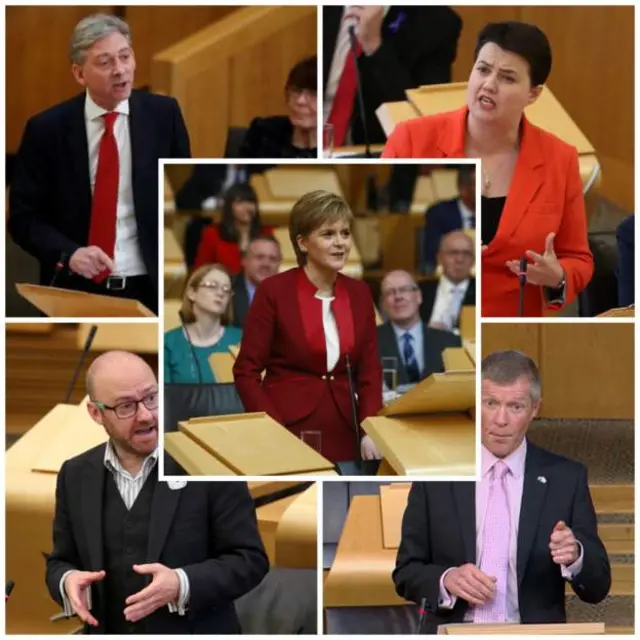 Image source, PA/BBC
Image source, PA/BBCWatch the whole of first minister's questions again by hitting the play icon and scrolling back to 12pm
Davidson asks why parents are 'in the dark' about numeracy levels
Sturgeon insists there's more data at every level of the education system now
Rennie and Leonard press the government on mental health and Harvie asks about cuts to the Climate Change Fund
The first minister cites record levels of mental health spend and staffing, and defends Climate Change Fund
Louise Wilson and Craig Hutchison
 Image source, PA/BBC
Image source, PA/BBC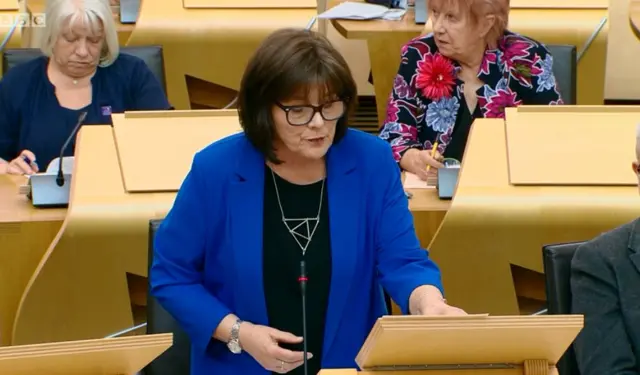 Image source, bbc
Image source, bbcHealth Secretary Jeanne Freeman
Health Secretary Jeanne Freeman says Scottish government officials and the mental health minister are in touch with NHS Tayside to discuss progress.
Ms Freeman says given the gravity of the concerns in Tayside an independent inquiry into mental health services was established in May last year.
Mr Bowman asks if the minister is aware that there is currently no out-of-hours mental health crisis service in Dundee.
The health secretary replies she was not aware of this but is happy to look at the details of the concern.
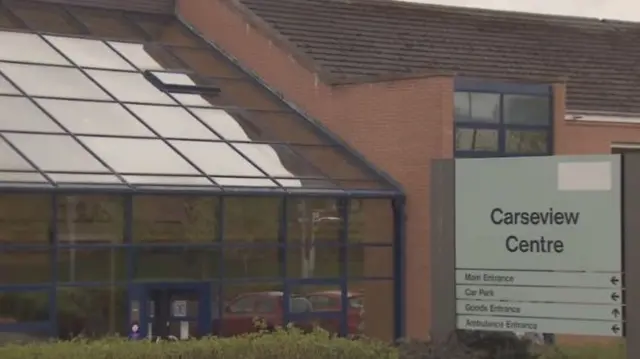 Image source, Google
Image source, GoogleAn independent inquiry into NHS Tayside's mental health services was launched with an appeal for personal testimonies in September.
Anyone who has engaged with mental health services in the region was urged to share their experiences.
It asked for individuals, families, carers, NHS staff and community groups to come forward.
The call for evidence followed three months of preparation including the appointment of chairman David Strang.
An investigation was initially ordered into Dundee's Carseview Centre but was expanded following a campaign by families of people who took their own lives.
Tory MSP Bill Bowman asks what progress has been made in addressing the areas for improvement identified in the Healthcare Improvement Scotland report, Review of Adult Mental Health Services in Tayside .
Allow X content?
This article contains content provided by X. We ask for your permission before anything is loaded, as they may be using cookies and other technologies. You may want to read X’s cookie policy, external and privacy policy, external before accepting. To view this content choose ‘accept and continue’.
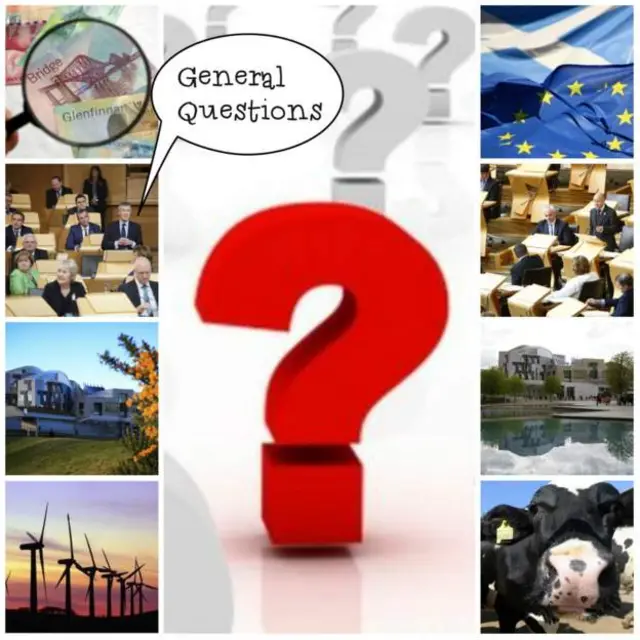 Image source, Getty/Thinkstock
Image source, Getty/Thinkstock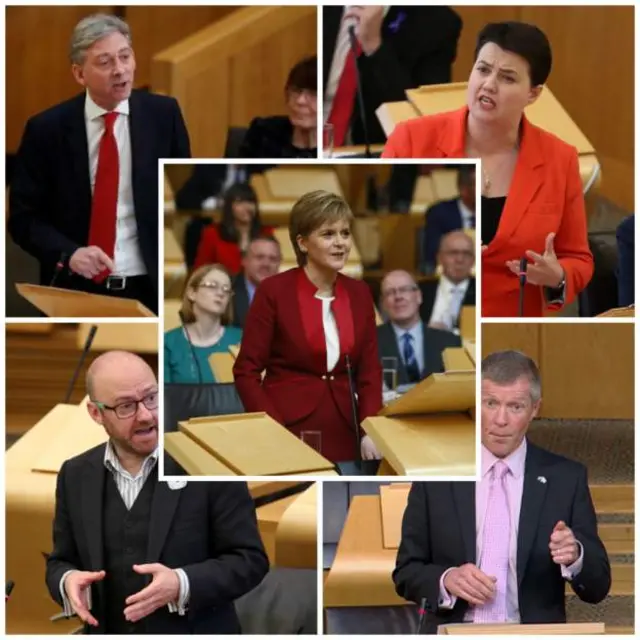 Image source, PA/BBC
Image source, PA/BBCAfter general questions, we'll be providing extensive coverage of and live reaction to first minister's questions.
Then Tory MSP Alexander Stewart leads a debate on Community Pharmacy Scotland.
After lunch, justice portfolio questions will take place.
The final debate of the week will be on Brexit's impact on food and drink.
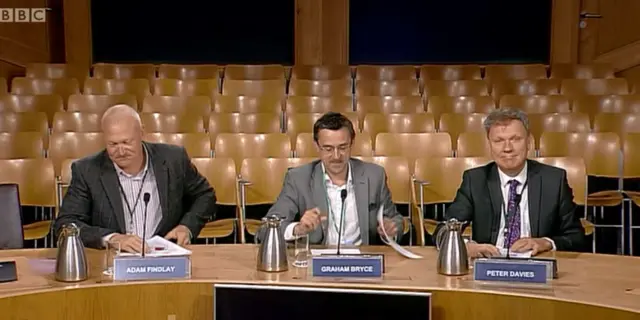 Image source, bbc
Image source, bbcAdam Findlay calls for the price of DAB carriage to be proportionate for what a station can afford.
He says Ofcom has been wedded to DAB, which has only recently started to flex in a multi-platform future.
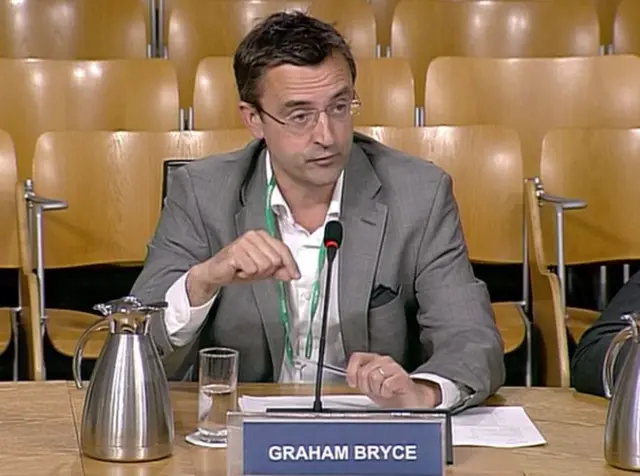
Graham Bryce says "DAB is the future," highlighting over half of listening in the UK is now digital.
70% of Bauer listeners are from digital sources, he adds.
Peter Davies from Bauer says he hopes it will not be another ten years before Ofcom look at this and calls for radio regulations to be kept under review.
His colleague Graham Bryce adds we have long argued that radio has been over-regulated.
"We would always vote for more deregulation."
Mr Bryce explains that is because there is an environment where some people are completely unregulated.
Allow X content?
This article contains content provided by X. We ask for your permission before anything is loaded, as they may be using cookies and other technologies. You may want to read X’s cookie policy, external and privacy policy, external before accepting. To view this content choose ‘accept and continue’.
Allow X content?
This article contains content provided by X. We ask for your permission before anything is loaded, as they may be using cookies and other technologies. You may want to read X’s cookie policy, external and privacy policy, external before accepting. To view this content choose ‘accept and continue’.
SNP MSP Annabelle Ewing asks if Ofcom has outgrown its usefulness.
"I wouldn't say that," replies Adam Findlay.
The DC Thomson representative points out there are a large number of digital disrupters coming into the market and there is still a degree of protection that is required.
He argues he does not get the same protection as other big operators and is not afforded the same opportunities by Ofcom.
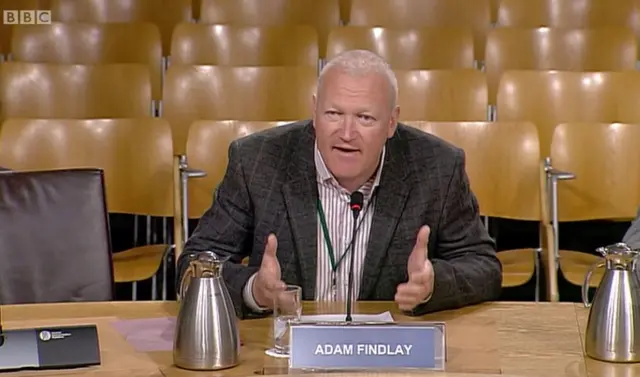
Adam Findlay from DC Thomson explains the 100% local model applied by his company is purely because it has not been given the same expansion opportunities as others.
We can't afford to be in the market because the DAB carriage is too expensive for us, he tells the committee.
So we've not been afforded opportunity on DAB nor have we been given FM licenses, Mr Findlay states.
"So where do we go? That's the heart of where this debate lies."
Pivoting to the FM license in Glasgow, he says DC Thomson and Bauer expresses serious concerns about it being awarded to Nation.
He says they had the "weakest application and weakest model", and indeed did not even get on air before it was sold.
Mr Findlay suggests Ofcom may not be making decisions in the best interests of commercial radio.
Mr Greene asks if these deregulatory changes were absolutely necessary.
Peter Davies replies: "I think that's right."
The Bauer rep says in making his argument for deregulation he had to look at the next ten years.
He says Bauer will just have to change its approach to maximise its presence on all the different platforms.
It's about having the flexibility to serve audiences in the best way, Mr Davies concludes.
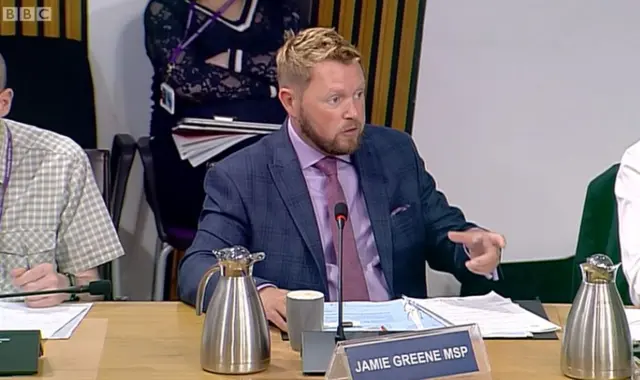
Tory MSP Jamie Greene highlights Radio Clyde numbers are up but Radio Forth numbers are down.
He wonders if this is because while Radio Clyde is 100% local content, some of Radio Forth's content comes from Glasgow.
Graham Bryce refutes this suggestion, saying radio stations in Scotland are "in general" in the same place they were ten years ago in terms of numbers.
He confirms that local content would be - and has been - reinstated if it was felt the decision to use network content was impacting listener numbers.
Allow X content?
This article contains content provided by X. We ask for your permission before anything is loaded, as they may be using cookies and other technologies. You may want to read X’s cookie policy, external and privacy policy, external before accepting. To view this content choose ‘accept and continue’.
Mr Findlay cites the slow progress of DAB growth which has been frustrating.
The DC Thomson representative says he believes punishment rewards were being handed out by Ofcom if they did not move to DAB carriage, with analogue licenses being put at serious risk.
"The main reason and the main driver for us going on DAB is to protect our FM licence from the very hard fist of Ofcom's regulatory processes."
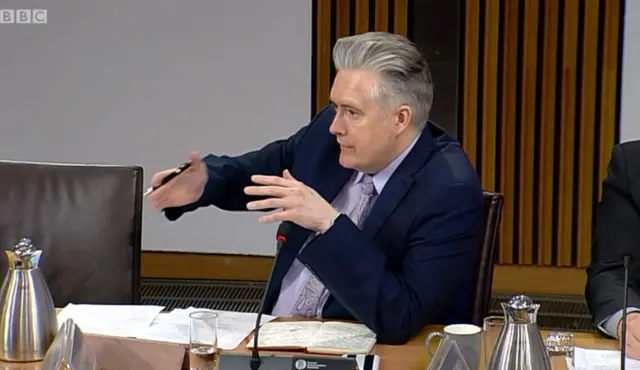 Image source, bbc
Image source, bbcSNP MSP George Adam quizzes Bauer representatives
SNP MSP George Adam asks about Bauer's plans for the future.
We don't make content choices based on regulations, we make them based on what the listener wants, insists Graham Bryce.
Our lobbying around the regulatory framework is to enable us to be able to adapt to the future landscape, he explains.
If the listeners still love what we do, as they do, we are going to keep things are they are, Mr Bryce tells the committee.
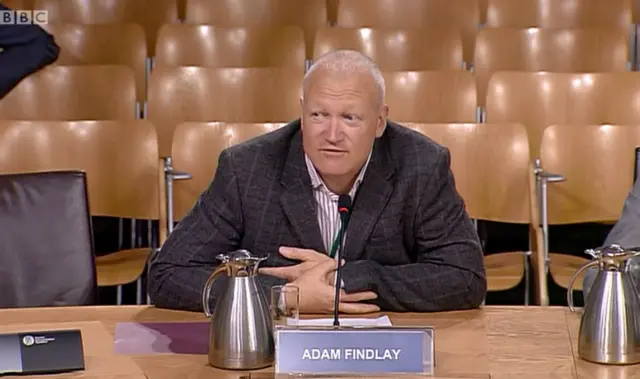 Image source, bbc
Image source, bbcLib Dem MSP Tavish Scott asks for forgiveness for his "daft laddy question" which is: why do they want to expand FM.
Mr Findlay replies: "FM is still where you are able to reach most of the audience."
He says the evidence from Ofcom this morning was "interesting," arguing the regulator used to use a "Rolls Royce" way of measuring audience levels.
They've moved from Tech Tracker to Rajar which asks a different question and Rajar gives the highest possible answer, he elucidates.
Ofcom has not afforded the opportunity to expand FM which is frustrating his business, adds the DC Thomson representative.
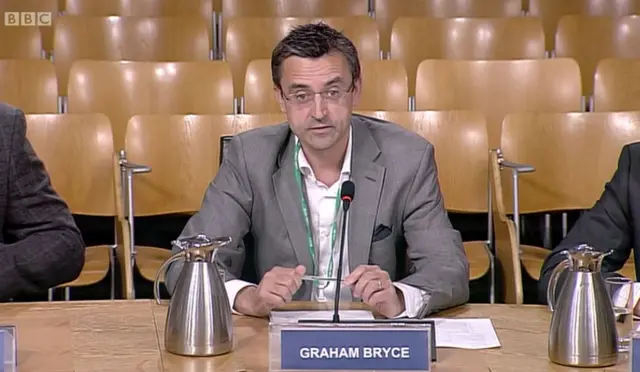
Graham Bryce from Bauer Media
Graham Bryce from Bauer Media says content is driven by listener demand, adding Bauer outperforms even the BBC in terms of figures.
Ms McAlpine asks about listener figures compared to 20 years ago.
Mr Bryce says they are less because of the increase in the number of competitors, both in terms of online and traditional platforms.
But for example Radio Clyde continues to be the most listened to of all the stations on offer in the area, he adds.